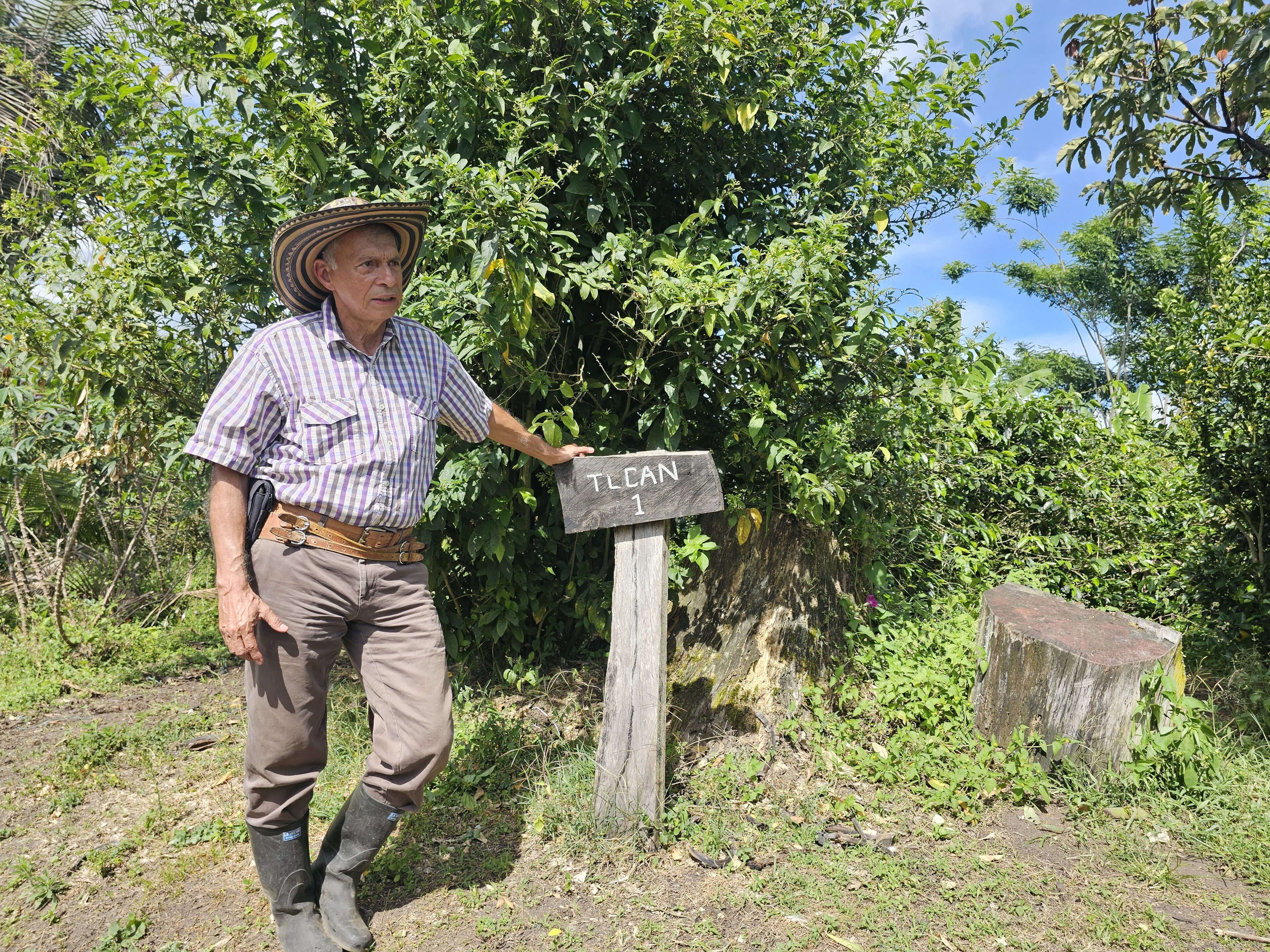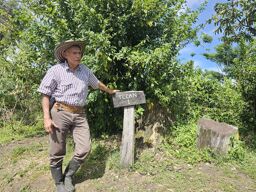"Conservation of the environment is vital and transcendent for us: we take care of the forests, all the biodiversity in our territory, and we protect the wildlife, flora, and the seven water sources that originate within the farm."
Tierra Linda
Colombia - Quindio - Salento - Tierra Linda - Tabi - Washed by Sail
Pick your crop :
Aromatic notes:
Spot price
€/kg
"Tierra Linda, a legacy of our ancestors that we want to keep alive"
The farm is located on a high ground, forming a sort of plateau, approximately 1,000 meters in straight-line distance and at an altitude of around 1600 meters above sea level (msnm). The Quindío River passes by about 2000 meters downhill from the mountain, and the Navarco River surrounds the farm, along with a small stream (creek). The farm is nestled among mountains. All these water sources, cold air currents descending from the mountains, and the environmental conditions create an ecotope that significantly favors our crops. This environment generates special microclimatic conditions. Additionally, the farm has biological corridors that help preserve the local fauna and flora.
Marketing tools & Certifications
POS displays, postcards, QR codes for packaging, ...
- Colombia
Origin
region
Quindio terroir
Salento - Tierra Linda
Farm
- Alfredo Gutierrez
Producer
Species
Arabica Variety
Tabi
Process
Washed
Drying
Drying beds
Packaging
70kg - Jute bags
Altitude
1900 Area
30 hectares Harvest period
March - June Type of harvest
Manual
Terroir Salento
Salento is a municipality in the Quindío department of Colombia, known as the "Father Municipality of Quindío" for being the oldest in the department and the birthplace of the national tree, the Wax Palm. It offers a range of tourist attractions, including the Cocora Valley, renowned for its lush landscapes, wildlife like the Barranquero (Momotus aequatorialis), and opportunities for ecological hiking. The average temperature is 17°C. Salento has a population of around 3,000 in the urban area and 5,500 in the rural areas. Located in the northeastern part of Quindío at 4° 38′ 14″ N latitude and 75° 34′ 15″ W longitude, its elevation ranges from 1,300 meters in the lower areas to 4,750 meters in its snowy regions. It borders Risaralda to the north, Calarcá and Armenia to the south, Tolima to the east, and Circasia and Filandia to the west.

Meet Alfredo Gutierrez
A few words about Alfredo Gutierrez
"My paternal grandparents (Cristóbal Gutiérrez and Griselda Santamaría) and maternal grandparents (Anastasio Collazos and Custodia Salazar) were settlers in Quindío, arriving in these lands around 1910. The paternal side came from a town in the department of Cundinamarca called Tocaima (450 meters above sea level). They emigrated from their homeland in search of a better future, motivated by the comments of others who described the lands beyond the Central Mountain Range as an Eden, a paradise with very fertile and promising soils. They undertook their journey entirely on foot, with two horses. My grandmother Griselda rode on one horse, while the other carried their two babies in two baskets made from plant fibers, both under the age of two. They traveled through the city of Ibagué (1250 meters above sea level), the capital of the Tolima department, and arrived in the town of Salento (1895 meters above sea level) via the National Road (3000 meters above sea level), a path traversed by Simón Bolívar in 1830. This road was a mule trail used by muleteers to transport goods, a journey that lasted nearly 4 months. They recounted to my father and uncles how their feet were severely blistered, as footwear at that time consisted of espadrilles or cotizas.
From Salento, they moved to a village called La Albania in Calarcá, where some of their fellow countrymen had settled. Through them, they arrived in Quindío, where my grandfather took a portion of land, initially uncultivated, and started growing coffee, as the economic importance of coffee and its enjoyable beverage were already recognized.
In Quindío, my paternal grandparents had 9 more children, totaling 11 children: 5 daughters and 6 sons, all of whom were taught agricultural work. My grandfather passed away at the age of 49. My father, Alfredo, was compelled to venture out into the world at a young age. With what he inherited, he acquired a farm in the municipality of Quimbaya, Quindío, called La Esperanza, where he moved with my mother Evelia, who was the daughter of a worker on his father's farm located on the border between Armenia and Montenegro municipalities.
My maternal grandparents had arrived from Ambalema, located in the Tolima department, with three children: one son and two daughters. In the farm where my parents lived, they had two children: Alfredo (myself) and Hoover. From there, they were forced to leave the farm to save their lives, due to the senseless bipartisan violence that plagued the country at that time, and still persists in different forms. They arrived in Armenia, an emerging town where they felt safer than on the farm.
Later, my father acquired another farm named Bolívar, which he sold to a brother, and with the proceeds, acquired a coffee farm called La Floresta in the municipality of Montenegro. Around this time, in 1976, my mother Evelia Collazos S passed away.
In 1982, violence once again affected us deeply when my father was violently attacked on the farm. Due to this distressing situation, my father decided to sell La Floresta, and it was then that we acquired the farm we still hold today: La Linda. I note that coffee was always present in my parents' lives, and we, their children, learned the tasks from a young age. I am deeply grateful to the universe for this upbringing, which has allowed me to maintain the farm and cherish coffee as a significant part of my life, as it was for my parents.
Through their efforts and vision, my parents never ceased in their determination to see us become professionals: I graduated as a Business Administrator from the University of Colombia. Despite pursuing my professional career, I have always remained connected to Armenia and the farm, as it was their hope for life.
My beginnings with coffee were in the cradle where I was born. From my father, I inherited his passion, his love for the land, his gratitude to the Creator, and of course, his love for coffee. He taught me a lot, and today, even though he's no longer with us, I believe he must feel very proud, wherever he is, because we haven't abandoned coffee cultivation, nor have we sold the land.
Additionally, I have taken courses at SENA on various processes of the coffee production chain, completed a 500-hour Diploma with Tecnicafé, attended numerous field days with the Coffee Growers Committee of Quindío, and I will continue to educate myself because coffee will always be a part of my life. My desire is to improve processes to ensure excellent quality in the final product".
Analyzed to the nearest gram
Find detailed physical and sensory analyzes of your coffee in the quality sheet with:
- Density
- The humidity level
- Water activity
- Colorimetry
- The sieve
- The nature of the defects
- The score and its details
- The aromatic profile (downloadable)
Equipments selection
Unit price
€ ex.tax/U
From xx products
€ ex.tax/U
Unit price
€ ex.tax/U
From xx products
€ ex.tax/U
Unit price
€ ex.tax/U
From xx products
€ ex.tax/U
Unit price
€ ex.tax/U
From xx products
€ ex.tax/U
Unit price
€ ex.tax/U
From xx products
€ ex.tax/U
Unit price
€ ex.tax/U
From xx products
€ ex.tax/U
Unit price
€ ex.tax/U
From xx products
€ ex.tax/U

